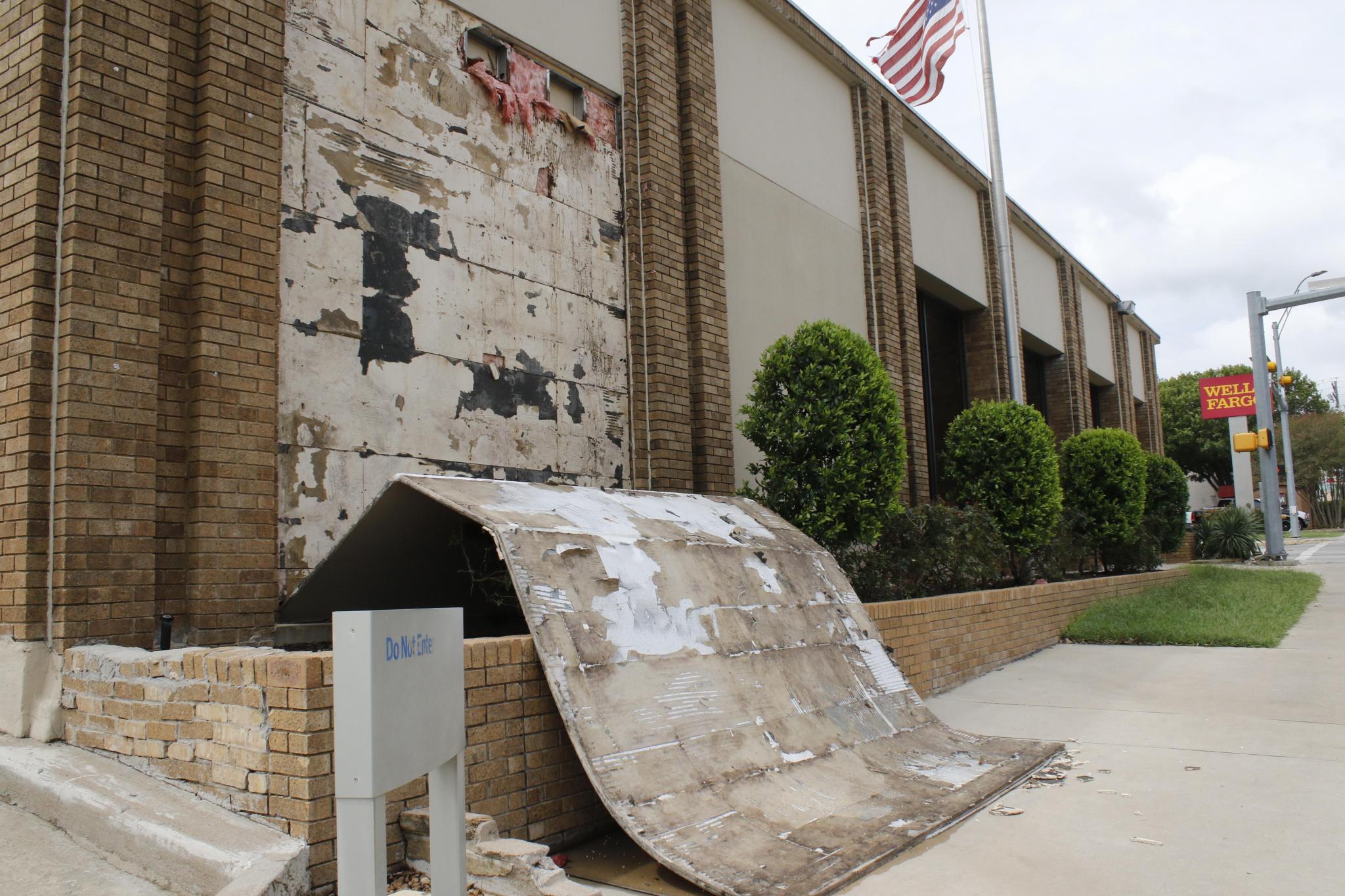
Harvey’s winds were sufficient to peel the facade off a downtown bank last year. Daily Record file photo
Survey: Texans not prepared for storm
Florida has the jump on Texas this year in terms of hurricane preparedness.
Approaching the one-year anniversary of Hurricane Harvey’s initial Texas landfall, the Department of Public Safety and other authorities are advising Texans to prepare; but at the same time a new poll indicates the vast majority have not. That’s in contrast to what’s being reported in the Sunshine State.
Harvey moved ashore at St. Jose Island on Aug. 25 and proved to be the second most expensive hurricane in U.S. history, inflicting $125 billion in damage, according to the Property Casualty Insurers Association of America (PCI). Only Katrina had a higher cost, at $160 billion. Harvey did set the record for the most rainfall dumped, which was up to 60 inches in some locations. Previously, the rainfall record had been held by 1978’s Hurricane Amelia, which dumped up to 48 inches.
In a poll conducted for PCI by SurveyMonkey, 72 percent of Texans said they had not taken any precautions this year despite the fact 15 percent of those had property damaged by Harvey. In contrast, 64 percent of Floridians said they have taken precautions.
In all, Harvey made landfall five times and stalled over south central Texas, bringing tropical storm-force winds to Hays and surrounding counties for more than 48 hours.
Though the Atlantic hurricane season started June 1 and will not expires until Nov. 30, August and September are traditionally the times the most intense storms tend to strike the Texas coast.
According to FEMA, 80 percent of all households affected by Harvey did not have flood insurance. Despite that, 75 percent have not talked to their insurers about additional coverage and more than 15 percent don’t know if their policy would cover hurricane damage.
“These results are disappointing as we saw first-hand the devastation of Hurricane Harvey,” Joe Woods, vice president of state government relations for PCI, said. “As we enter what is traditionally the peak of hurricane season we encourage residents to proactively speak to their insurance agents about purchasing additional flood insurance coverage.”
San Marcos is a comfortable distance from the Texas coast but is subject to the effects of hurricanes in both the Atlantic and Pacific basins. The flood of 1998, which occurred in mid-October of that year, resulted when two Pacific hurricanes merged and were met with a cold front over Central Texas.
That means residents here need to have emergency plans just like those of coastal residents. Regarding those plans, the poll found that just 38 percent of Texans “are familiar with their local municipality, county or state evacuation plan, with the same percentage saying they have deployed an emergency plan and shared it with their household.” Some 63 percent polled “do not have an emergency bag, which includes necessities such as medication, non-perishable food and water,” and that “nearly 71 percent of all residents have not conducted a home inventory in the event that property and/or possessions are destroyed, damaged, or lost in a disaster.”
Moreover, the poll found that more than a third (37 percent) “do not have readily available cash or savings to meet short-term expenses that may arise following a natural disaster” and “only 57 percent report that they have stored important financial papers and comments in a safe deposit box or online for easy access.”
In addition to the above, the DPS also urges Texans to plan for their pets and for any family members that are elderly or have special needs. The agency also warned that most flood insurance policies have a 30-day waiting period before taking effect.
Residents are also encouraged to register with the State of Texas Emergency Assistance Registry (STEAR). It is “a free registry that provides emergency planners and responders with additional information about the needs in their communities.” Dial 211 to get started.











